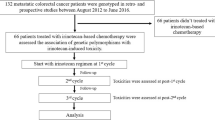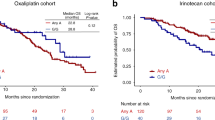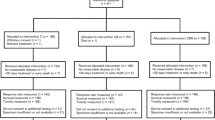Abstract
The objective of the study was to investigate whether specific single nucleotide polymorphisms (SNPs) with influence on drug transport, biotransformation and repair mechanisms are associated with treatment outcome and toxicity in metastatic colorectal cancer (mCRC). We genotyped blood samples from 519 mCRC patients treated with first-line 5-fluorouracil and oxaliplatin +/− cetuximab for 17 SNPs in 10 genes involved in membrane transport (ABCC1 and ABCC2), drug biotransformation (GSTP1 and AGXT) and DNA repair (ERCC1, ERCC2, XRCC1, XRCC3, XPG and MSH6). The AGXT-rs34116584 and the ERCC2-rs238406 polymorphisms were significantly associated with progression-free survival (P=0.002 and P=0.001, respectively). Associations between 18 toxicity variables and SNPs were identified, although none were significant after Bonferroni correction for multiple comparisons. The study identified SNPs of potential use as markers of clinical outcome in oxaliplatin-treated mCRC patients. If validated in other studies, they could improve the selection of therapy in mCRC.
This is a preview of subscription content, access via your institution
Access options
Subscribe to this journal
Receive 6 print issues and online access
$259.00 per year
only $43.17 per issue
Buy this article
- Purchase on Springer Link
- Instant access to full article PDF
Prices may be subject to local taxes which are calculated during checkout

Similar content being viewed by others
References
Cunningham D, Atkin W, Lenz HJ, Lynch HT, Minsky B, Nordlinger B et al. Colorectal cancer. Lancet 2010; 375: 1030–1047.
de GA, Figer A, Seymour M, Homerin M, Hmissi A, Cassidy J et al. Leucovorin and fluorouracil with or without oxaliplatin as first-line treatment in advanced colorectal cancer. J Clin Oncol 2000; 18: 2938–2947.
Jensen NF, Smith DH, Nygard SB, Romer MU, Nielsen KV, Brunner N . Predictive biomarkers with potential of converting conventional chemotherapy to targeted therapy in patients with metastatic colorectal cancer. Scand J Gastroenterol 2012; 47: 340–355.
Ibrahim A, Hirschfeld S, Cohen MH, Griebel DJ, Williams GA, Pazdur R . FDA drug approval summaries: oxaliplatin. Oncologist 2004; 9: 8–12.
Benhaim L, Labonte MJ, Lenz HJ . Pharmacogenomics and metastatic colorectal cancer: current knowledge and perspectives. Scand J Gastroenterol 2012; 47: 325–339.
Cortejoso L, Lopez-Fernandez LA . Pharmacogenetic markers of toxicity for chemotherapy in colorectal cancer patients. Pharmacogenomics 2012; 13: 1173–1191.
Strimpakos AS, Syrigos KN, Saif MW . Pharmacogenetics and biomarkers in colorectal cancer. Pharmacogenomics J 2009; 9: 147–160.
Shirota Y, Stoehlmacher J, Brabender J, Xiong YP, Uetake H, Danenberg KD et al. ERCC1 and thymidylate synthase mRNA levels predict survival for colorectal cancer patients receiving combination oxaliplatin and fluorouracil chemotherapy. J Clin Oncol 2001; 19: 4298–4304.
Grimminger PP, Shi M, Barrett C, Lebwohl D, Danenberg KD, Brabender J et al. TS and ERCC-1 mRNA expressions and clinical outcome in patients with metastatic colon cancer in CONFIRM-1 and -2 clinical trials. Pharmacogenomics J 2012; 12: 404–411.
Chang IY, Kim MH, Kim HB, Lee DY, Kim SH, Kim HY et al. Small interfering RNA-induced suppression of ERCC1 enhances sensitivity of human cancer cells to cisplatin. Biochem Biophys Res Commun 2005; 327: 225–233.
Chang PM, Tzeng CH, Chen PM, Lin JK, Lin TC, Chen WS et al. ERCC1 codon 118 C–>T polymorphism associated with ERCC1 expression and outcome of FOLFOX-4 treatment in Asian patients with metastatic colorectal carcinoma. Cancer Sci 2009; 100: 278–83.
Chen YC, Tzeng CH, Chen PM, Lin JK, Lin TC, Chen WS et al. Influence of GSTP1 I105V polymorphism on cumulative neuropathy and outcome of FOLFOX-4 treatment in Asian patients with colorectal carcinoma. Cancer Sci 2010; 101: 530–535.
Huang MY, Huang ML, Chen MJ, Lu CY, Chen CF, Tsai PC et al. Multiple genetic polymorphisms in the prediction of clinical outcome of metastatic colorectal cancer patients treated with first-line FOLFOX-4 chemotherapy. Pharmacogenet Genomics 2011; 21: 18–25.
Ruzzo A, Graziano F, Loupakis F, Rulli E, Canestrari E, Santini D et al. Pharmacogenetic profiling in patients with advanced colorectal cancer treated with first-line FOLFOX-4 chemotherapy. J Clin Oncol 2007; 25: 1247–1254.
Stoehlmacher J, Park DJ, Zhang W, Yang D, Groshen S, Zahedy S et al. A multivariate analysis of genomic polymorphisms: prediction of clinical outcome to 5-FU/oxaliplatin combination chemotherapy in refractory colorectal cancer. Br J Cancer 2004; 91: 344–354.
Park DJ, Zhang W, Stoehlmacher J, Tsao-Wei D, Groshen S, Gil J et al. ERCC1 gene polymorphism as a predictor for clinical outcome in advanced colorectal cancer patients treated with platinum-based chemotherapy. Clin Adv Hematol Oncol 2003; 1: 162–166.
Yin M, Yan J, Martinez-Balibrea E, Graziano F, Lenz HJ, Kim HJ et al. ERCC1 and ERCC2 polymorphisms predict clinical outcomes of oxaliplatin-based chemotherapies in gastric and colorectal cancer: a systemic review and meta-analysis. Clin Cancer Res 2011; 17: 1632–1640.
Pare L, Marcuello E, Altes A, del RE, Sedano L, Salazar J et al. Pharmacogenetic prediction of clinical outcome in advanced colorectal cancer patients receiving oxaliplatin/5-fluorouracil as first-line chemotherapy. Br J Cancer 2008; 99: 1050–1055.
Viguier J, Boige V, Miquel C, Pocard M, Giraudeau B, Sabourin JC et al. ERCC1 codon 118 polymorphism is a predictive factor for the tumor response to oxaliplatin/5-fluorouracil combination chemotherapy in patients with advanced colorectal cancer. Clin Cancer Res 2005; 11: 6212–6217.
Lee KH, Chang HJ, Han SW, Oh DY, Im SA, Bang YJ et al. Pharmacogenetic analysis of adjuvant FOLFOX for Korean patients with colon cancer. Cancer Chemother Pharmacol 2013; 71: 843–851.
Inada M, Sato M, Morita S, Kitagawa K, Kawada K, Mitsuma A et al. Associations between oxaliplatin-induced peripheral neuropathy and polymorphisms of the ERCC1 and GSTP1 genes. Int J Clin Pharmacol Ther 2010; 48: 729–734.
Kweekel DM, Gelderblom H, Guchelaar HJ . Pharmacology of oxaliplatin and the use of pharmacogenomics to individualize therapy. Cancer Treat Rev 2005; 31: 90–105.
Stoehlmacher J, Park DJ, Zhang W, Groshen S, Tsao-Wei DD, Yu MC et al. Association between glutathione S-transferase P1, T1, and M1 genetic polymorphism and survival of patients with metastatic colorectal cancer. J Natl Cancer Inst 2002; 94: 936–942.
McLeod HL, Sargent DJ, Marsh S, Green EM, King CR, Fuchs CS et al. Pharmacogenetic predictors of adverse events and response to chemotherapy in metastatic colorectal cancer: results from North American Gastrointestinal Intergroup Trial N9741. J Clin Oncol 2010; 28: 3227–3233.
Watson MA, Stewart RK, Smith GB, Massey TE, Bell DA . Human glutathione S-transferase P1 polymorphisms: relationship to lung tissue enzyme activity and population frequency distribution. Carcinogenesis 1998; 19: 275–280.
Lecomte T, Landi B, Beaune P, Laurent-Puig P, Loriot MA . Glutathione S-transferase P1 polymorphism (Ile105Val) predicts cumulative neuropathy in patients receiving oxaliplatin-based chemotherapy. Clin Cancer Res 2006; 12: 3050–3056.
Kanai M, Yoshioka A, Tanaka S, Nagayama S, Matsumoto S, Nishimura T et al. Associations between glutathione S-transferase pi Ile105Val and glyoxylate aminotransferase Pro11Leu and Ile340Met polymorphisms and early-onset oxaliplatin-induced neuropathy. Cancer Epidemiol 2010; 34: 189–193.
Boige V, Mendiboure J, Pignon JP, Loriot MA, Castaing M, Barrois M et al. Pharmacogenetic assessment of toxicity and outcome in patients with metastatic colorectal cancer treated with LV5FU2, FOLFOX, and FOLFIRI: FFCD 2000-05. J Clin Oncol 2010; 28: 2556–2564.
Etienne-Grimaldi MC, Milano G, Maindrault-Goebel F, Chibaudel B, Formento JL, Francoual M et al. Methylenetetrahydrofolate reductase (MTHFR) gene polymorphisms and FOLFOX response in colorectal cancer patients. Br J Clin Pharmacol 2010; 69: 58–66.
Braun MS, Richman SD, Thompson L, Daly CL, Meade AM, Adlard JW et al. Association of molecular markers with toxicity outcomes in a randomized trial of chemotherapy for advanced colorectal cancer: the FOCUS trial. J Clin Oncol 2009; 27: 5519–5528.
Kweekel DM, Gelderblom H, Antonini NF, van der ST, Nortier JW, Punt CJ et al. Glutathione-S-transferase pi (GSTP1) codon 105 polymorphism is not associated with oxaliplatin efficacy or toxicity in advanced colorectal cancer patients. Eur J Cancer 2009; 45: 572–578.
Cavaletti G, Alberti P, Marmiroli P . Chemotherapy-induced peripheral neurotoxicity in the era of pharmacogenomics. Lancet Oncol 2011; 12: 1151–1161.
Gamelin L, Capitain O, Morel A, Dumont A, Traore S, Anne LB et al. Predictive factors of oxaliplatin neurotoxicity: the involvement of the oxalate outcome pathway. Clin Cancer Res 2007; 13: 6359–6368.
Cecchin E, D’Andrea M, Lonardi S, Zanusso C, Pella N, Errante D et al. A prospective validation pharmacogenomic study in the adjuvant setting of colorectal cancer patients treated with the 5-fluorouracil/leucovorin/oxaliplatin (FOLFOX4) regimen. Pharmacogenomics J 2013; 13: 403–409.
Huang L, Wang C, Zheng W, Liu R, Yang J, Tang C . Effects of celecoxib on the reversal of multidrug resistance in human gastric carcinoma by downregulation of the expression and activity of P-glycoprotein. Anticancer Drugs 2007; 18: 1075–1080.
Theile D, Grebhardt S, Haefeli WE, Weiss J . Involvement of drug transporters in the synergistic action of FOLFOX combination chemotherapy. Biochem Pharmacol 2009; 78: 1366–1373.
Tveit KM, Guren T, Glimelius B, Pfeiffer P, Sorbye H, Pyrhonen S et al. Phase III trial of cetuximab with continuous or intermittent fluorouracil, leucovorin, and oxaliplatin (Nordic FLOX) versus FLOX alone in first-line treatment of metastatic colorectal cancer: the NORDIC-VII study. J Clin Oncol 2012; 30: 1755–1762.
Therasse P, Arbuck SG, Eisenhauer EA, Wanders J, Kaplan RS, Rubinstein L et al. New guidelines to evaluate the response to treatment in solid tumors. European Organization for Research and Treatment of Cancer, National Cancer Institute of the United States, National Cancer Institute of Canada. J Natl Cancer Inst 2000; 92: 205–216.
Napolioni V . The relevance of checking population allele frequencies and Hardy-Weinberg Equilibrium in genetic association studies: the case of SLC6A4 5-HTTLPR polymorphism in a Chinese Han Irritable Bowel Syndrome association study. Immunol Lett 2014; 162: 276–278.
Purdue PE, Takada Y, Danpure CJ . Identification of mutations associated with peroxisome-to-mitochondrion mistargeting of alanine/glyoxylate aminotransferase in primary hyperoxaluria type 1. J Cell Biol 1990; 111: 2341–2351.
Johnson AD, Handsaker RE, Pulit SL, Nizzari MM, O'Donnell CJ, de Bakker PI . SNAP: a web-based tool for identification and annotation of proxy SNPs using HapMap. Bioinformatics 2008; 24: 2938–2939.
Pey AL, Albert A, Salido E . Protein homeostasis defects of alanine-glyoxylate aminotransferase: new therapeutic strategies in primary hyperoxaluria type I. Biomed Res Int 2013; 2013: 687658.
Kumar P, Henikoff S, Ng PC . Predicting the effects of coding non-synonymous variants on protein function using the SIFT algorithm. Nat Protoc 2009; 4: 1073–1081.
Grolleau F, Gamelin L, Boisdron-Celle M, Lapied B, Pelhate M, Gamelin E . A possible explanation for a neurotoxic effect of the anticancer agent oxaliplatin on neuronal voltage-gated sodium channels. J Neurophysiol 2001; 85: 2293–2297.
Wu W, Zhang W, Qiao R, Chen D, Wang H, Wang Y et al. Association of XPD polymorphisms with severe toxicity in non-small cell lung cancer patients in a Chinese population. Clin Cancer Res 2009; 15: 3889–3895.
Yin J, Li J, Ma Y, Guo L, Wang H, Vogel U . The DNA repair gene ERCC2/XPD polymorphism Arg 156Arg (A22541C) and risk of lung cancer in a Chinese population. Cancer Lett 2005; 223: 219–226.
Furuta T, Ueda T, Aune G, Sarasin A, Kraemer KH, Pommier Y . Transcription-coupled nucleotide excision repair as a determinant of cisplatin sensitivity of human cells. Cancer Res 2002; 62: 4899–4902.
Aloyz R, Xu ZY, Bello V, Bergeron J, Han FY, Yan Y et al. Regulation of cisplatin resistance and homologous recombinational repair by the TFIIH subunit XPD. Cancer Res 2002; 62: 5457–5462.
Duldulao MP, Lee W, Nelson RA, Ho J, Le M, Chen Z et al. Gene polymorphisms predict toxicity to neoadjuvant therapy in patients with rectal cancer. Cancer 2013; 119: 1106–1112.
Wang Z, Xu B, Lin D, Tan W, Leaw S, Hong X et al. XRCC1 polymorphisms and severe toxicity in lung cancer patients treated with cisplatin-based chemotherapy in Chinese population. Lung Cancer 2008; 62: 99–104.
Han B, Gao G, Wu W, Gao Z, Zhao X, Li L et al. Association of ABCC2 polymorphisms with platinum-based chemotherapy response and severe toxicity in non-small cell lung cancer patients. Lung Cancer 2011; 72: 238–243.
Tournigand C, Andre T, Achille E, Lledo G, Flesh M, Mery-Mignard D et al. FOLFIRI followed by FOLFOX6 or the reverse sequence in advanced colorectal cancer: a randomized GERCOR study. J Clin Oncol 2004; 22: 229–237.
Cassidy J, Clarke S, az-Rubio E, Scheithauer W, Figer A, Wong R et al. Randomized phase III study of capecitabine plus oxaliplatin compared with fluorouracil/folinic acid plus oxaliplatin as first-line therapy for metastatic colorectal cancer. J Clin Oncol 2008; 26: 2006–2012.
Acknowledgements
The NORDIC-VII study was supported by Merck-Serono, Darmstadt, Germany and Sanofi-Aventis, Oslo, Norway. The NORDIC-VII study is registered under trial number NCT00145314. This work was supported by the South-Eastern Norway Regional Health Authority, Holes Foundation, the Swedish Cancer Society, and the Gustav V Jubilee Clinic Foundation for Cancer Research, Sweden. The funding organizations did not influence the conduct of the study, data analysis and interpretation of the data or approval of the manuscript.
Author information
Authors and Affiliations
Corresponding author
Ethics declarations
Competing interests
The authors declare no conflict of interest.
Additional information
Supplementary Information accompanies the paper on the The Pharmacogenomics Journal website
Supplementary information
PowerPoint slides
Rights and permissions
About this article
Cite this article
Kjersem, J., Thomsen, M., Guren, T. et al. AGXT and ERCC2 polymorphisms are associated with clinical outcome in metastatic colorectal cancer patients treated with 5-FU/oxaliplatin. Pharmacogenomics J 16, 272–279 (2016). https://doi.org/10.1038/tpj.2015.54
Received:
Revised:
Accepted:
Published:
Issue Date:
DOI: https://doi.org/10.1038/tpj.2015.54



